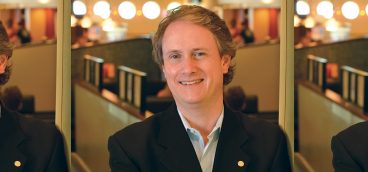Bayer CEO: Greg Babe

Other football players were bigger and faster. That didn’t hold back Greg Babe. During summer days, he would run up and down the steps inside Magnolia High School in New Martinsville, W. Va. while his friends hung out at the pool.
Those sweat-soaked workouts paid off: Babe rushed for 2,200 yards in 1975, a school record that stood for 34 years.
Next Babe outworked the competition at Virginia Tech University, where he was a Division I running back and engineering scholarship student. Babe, who transferred to West Virginia University, was the mechanical engineering student who would do every single problem in the book, not just the homework.
So maybe it’s inevitable that this ultimate overachiever would become the first non-German president and chief executive officer of Bayer Corp.’s North American operations. Maybe it was inevitable that he would work his way up from co-op engineer to CEO.
“I never considered myself a genius,” he says. “I do believe we can develop intelligence and wisdom over time.”
The 53-year-old has piercing blue eyes, which seem to home in on issues with a scientist’s clarity. From the time he was a little boy tinkering with household items, Babe has used logic to make sense of the world. His father, a chemical plant worker who repaired the family car, would show him how things worked. In school, science classes were a revelation.
“Physics was the greatest thing I ever discovered. It helped me understand how things moved, why things stopped, why they worked.” Then he lets out a laugh and says, “My children say, ‘Physics, Dad? You have to get a life.’ ”
But he is no tunnel-vision science geek. Babe, who regularly travels from his office in Robinson to Bayer AG headquarters in Leverkusen, Germany, traverses more than just time zones. His people skills lets him bridge the more hierarchical German management style of Bayer AG, the healthcare and chemicals company, with the more autonomous-minded style of the U.S. operations. He also benefited from the fact that the $43.3 billion company has made its management team more international.
Babe’s global ties also helped him land a big coup: Pittsburgh was named the North American host city for 2010 World Environment Day on June 5, after Babe lobbied the United Nations Environment Programme. Babe helped leverage the worldwide attention Pittsburgh received during the G20 Summit for this second designation.“This is a more nuanced spotlight on Pittsburgh than G20, but still a very positive spotlight,” he says.
Which is why on a recent evening he was at the Children’s Museum of Pittsburgh, handing out awards for a Bayer-sponsored student painting contest about the environment. The winner, Sylvia Gong, an eighth grader from Fremont, Calif., painted a tiger grieving over a world where humans are depleting resources.
The ceremony is not a place you would necessarily expect to find a chemical company executive, but Babe impressed at least one environmentalist there.
“Clearly Bayer Corporation has made sustainable development a top-line corporate commitment, not just a passing fad or narrow investment,” says Court Gould, executive director of Sustainable Pittsburgh.
Babe says chemical companies are sometimes maligned because they have not communicated effectively. “Part of it is our fault. We have not told our positive stories. We were slow to admit our mistakes.”
He cites an explosion on August 28, 2008 at the Bayer plant in Institute, W.Va., killing two employees and sparking a federal inquiry. He says the company did not get information to the public quickly enough.
“It was not managed as well as it should have been. You can’t make those mistakes and expect a high level of credibility.”
Babe, who was named CEO in October of 2008, a few months after the accident, has tried to make Bayer more accessible and responsive.On a recent day, Babe invited visitors into his office, overlooking the 300-acre Robinson campus, a natural wildlife preserve with deer, geese and a bird nesting program. His office is big. Airplane-hangar big. He seemed embarrassed by it.
“I am not a big fan of a big office,” he said. “I inherited it. It’s not my style.”
His style is a lot of interaction with the 16,300 North American employees he oversees. Every month, he invites 10 to 15 employees to a roundtable discussion with no agenda. He also holds town hall meetings, accessible to all employees through the Web.
If you walk along the campus, you will see a lot of female and minority scientists, a rarity at many companies. At Bayer’s U.S. facilities, 42 percent of the chemists and chemical engineers are female, and 32 percent of them are minorities. That’s no accident. Babe has worked hard to attract more women and minorities to Bayer.
“Why do girls run away from science at an early age?” he asks. “Why do minorities? Often, it is the quality of the teachers and the lack of role models.”
He points out a great role model—Dr. Mae C. Jemison, a chemical engineer, physician and astronaut who became the first African-American woman to orbit the earth aboard the space shuttle Endeavor. Babe says the country needs more role models like Jemison, whom he introduced for World Environment Day.
The quality of science teaching in schools is another issue, he says. Some science teachers are not comfortable with the subject matter or don’t teach it effectively. To remedy that, more than 1,000 Bayer volunteers go into the schools across the U.S. and help coach teachers about science education. Bayer also offers college scholarships to promising female and minority students and then hires them as interns or employees.
For all his interaction with employees, Babe works hard to carve out time for his family. Work-life balance is no easy task for someone who learned his work ethic on his grandparents’ dairy farm. He works every day, overseeing North American operations with sales of $10.7 billion, but tries not to come into the office on weekends so he can spend time with his four children—Bill, 25, Brandon, 23, Jaclyn, 21 and Jessica, 18. All four are standout basketball players, and he was always in the stands cheering them on. “I think he missed one of my basketball games because he was in Germany,” says Bill, who played at Mt. Lebanon High School and Allegheny College. “I don’t think I ever saw him so upset. When I have kids, that is how I want to be. I want them to know that I support them.”
His children’s world in Mt. Lebanon is much different than his blue-collar roots. But he and his wife Carla have worked hard to instill a good work ethic and teach them the value of money.
Bill, an account executive at Rogers Insurance Group, lives at home. But Babe charges his son rent and deposits it in a savings account. “I don’t want him living on money he doesn’t have.”
Then there was their allowance rule. The children always got their age in weekly allowance if they did certain chores.
“When you grow up, you see a lot of kids who are given everything. That was hard to see,” Bill says. “Now I realize it was a blessing in disguise.” If his children chose to save their allowance, Babe would match it. By the time his youngest son Brandon graduated from high school before becoming an engineer, he had $10,000 in the bank.
“I grew up without a lot. We don’t lead a typical lifestyle for someone in my position,” Babe says. “I don’t think we have been overly lavish.”He also makes time for himself most days during an evening walk in Mt. Lebanon. But this is no leisurely romp. He clocks five miles at a 4.2 mph pace. He has no iPod, no Blackberry. This is Greg Babe’s time to walk and think and let his ideas gel.





